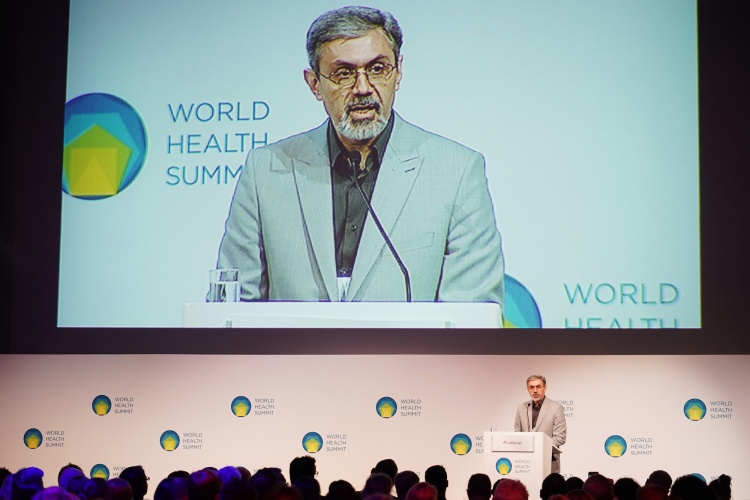2019 World Health Summit
Respect & Dialogue ,Prof. Ali Jafarian

Respect & Dialogue Ali Jafarian
The entire history of humanity has been much suffering from bigotry of firm believers who do not recognize diversity of thoughts and ideas, to the extent that groups like ISIS were established to kill others to pave their pathway towards the heaven! At the same time there are many promising and progressing ideas worldwide that would help human kind to better health and better life like partnership, collaboration and multilaterality.
When we talk about “respect” to others, it brings with it “recognition”. To establish dialogue, it is crucial to first recognize others as they are, then listen to them with respect, and then start the dialogue. Although this dialogue not always reach to a very meaningful conclusion, and each of us will behave in a way he or she finds to be correct, but talking with others and knowing more about what they think help everybody to take more appropriate action or reaction.
Let me share with you the view of Quran, perhaps the only divine book with only one version, about this: Allah says: “There is no compulsion in religion; righteousness stands on clear from Error certainly. He who disbelieves in the devil and believes in God has grasped the trustworthy hand-hold that never breaks. The God is all hearing and knowing.” Verse 256, Chapter 2,
Muslims therefore must tolerate diverse and even contradictory beliefs in strict subjects including religion as thoughts could not be changed by force and all we need is to keep dialogue.
Quran even goes further and instructs humans to remain calm even when they are against each other. In verse 44 of chapter 20, when the meeting between Moses and Pharaoh is narrated, God says to Moses: “You must speak with him in a gentle manner so that perhaps he may come to himself or have fear of God.”
Afterwards, if we took these steps and could not convince each other, Quran says to our prophet Muhammad PBUH: “say to the People of the Book, "We must come to a common term. Let us worship no one except God, nor consider anything equal to Him, nor regard any of us as our Lord besides God" Verse 64, Chapter 3.
While we have been asked to hold dialogue with each other on strict matters as religion, how could not we make constructive dialogue in science generally and Health specifically?
As the Theoretical Physicist, Stephen Hawking said: “Mankind greatest achievements have come about by talking and its greatest failure by not talking. With the technology at our disposal, the possibilities are unbounded. All we need to do is make sure we keep talking”. We are here at the World Health Summit to keep talking on global health challenges. The pillars of sustainable development and the SDG 3 (“Good Health and Well-Being”), SDG 16 (“Peace and Justice”) and SDG 17 (“Partnerships for the Goals”), have created helpful common grounds for our greatest hopes to become reality in the future. Pope Francis said "The dialogue that we need cannot fail to be open and respectful and then be fruitful. Reciprocal respect is the condition, and at the same time it is the aim, of inter-religious dialogue - respect of others' right to life, to physical health, to fundamental freedoms i.e. freedom of conscience, of thought, of expression and of religion". Hence, as advocates of global health, our responsibility is expanding the existing platforms for peace, respect, partnership, collaboration and multilaterality to achieve healthier life for all.
With powerful and multidimensional global health challenges we all are facing from unhealthy diet and life style to antimicrobial resistance and from inequality and poverty to inappropriate governance. We as global health advocates firstly must talk to ourselves to take an agreed upon position on these issues considering local contexts, and then should continuously deal with many others including politicians, international organizations, industry and civil society to keep them informed and convince them to stop any decision and action may affect people health worldwide. I know this is the most difficult job to do especially when it goes to politics, but this is our job if “science has to take responsibility” In brief, all we need to do is recognizing each other with respect and establish dialogue and partnership to overcome the complexity of global health problems, most of which are beyond the health system and need multisectoral collaboration. In the 7th WHS Regional meeting in Iran, 29-30 April 2019, we held a well-received panel on “global health and religions”, where members of Iranian parliament and high rank peoples from Christians, Zoroastrians and Jewish faiths presented and discussed their diverse views on how to combat the global health challenges. I hope we could make respect and dialogue superior to ignorance and violence, starting from health as one of the most basic human needs and rights.


Your Comment :